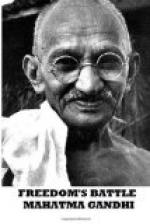to believe that our progress towards our goal is impossible
without British connection. It is this superstition
which makes some of the best of us tolerate the Punjab
wrong and the Khilafat insult. This blind adherence
to that connection makes us feel helpless. The
proposed alteration in the creed enables us to rid
ourselves of our helpless condition. I personally
hold that it is perfectly constitutional openly to
strive after independence, but lest there may be dispute
as to the constitutional character of any movement
for complete independence, the doubtful and highly
technical adjective “constitutional” has
been removed from the altered creed in the draft.
Surely it should be enough to ensure that the methods
for achieving our end are legitimate, honourable,
and peaceful, I believe that this was the reasoning
that guided my colleagues in accepting the proposed
creed. In any case, such was certainly my view
of the whole alteration. There is no desire on
my part to adopt any means that are subversive of law
and order. I know, however, that I am treading
on delicate ground when I write about law and order
for, to some of our distinguished leaders even my
present methods appear to be lawless and conducive
to disorder. But even they will perhaps grant
that the retention of the word ‘constitutional’
cannot protect the country against methods such as
I am employing. It gives rise, no doubt, to a
luminous legal discussion, but any such discussion
is fruitless when the nation means business. The
other important alteration refers to the limitation
of the number of delegates. I believe that the
advantages of such a limitation are obvious.
We are fast reaching a time when without any such limitation
the Congress will become an unwieldy body. It
is difficult even to have an unlimited number of visitors;
it is impossible to transact national business if
we have an unlimited number of delegates.
The next important alteration is about the election
of the members of the All-India Congress Committee,
making that committee practically the Subjects Committee,
and the redistribution of India for the purposes of
the Congress on a linguistic basis. It is not
necessary to comment on these alterations, but I wish
to add that if the Congress accepts the principle
of limiting the number of delegates it would be advisable
to introduce the principle of proportional representation.
That would enable all parties who wish to be represented
at the Congress.
I observe that the Servant of India sees an
inconsistency between my implied acceptance of the
British Committee, so far as the published draft constitution
is concerned, and my recent article in Young India
on that Committee and the newspaper India.
But it is well known that for several years I have
held my present views about the existence of that
body. It would have been irrelevant for me, perhaps,
to suggest to my colleagues the extinction of that
committee. It was not our function to report




